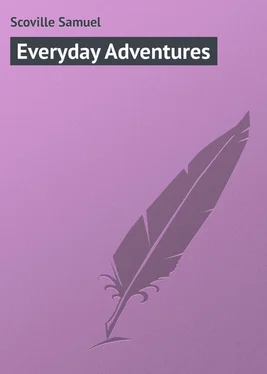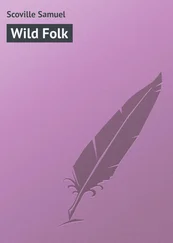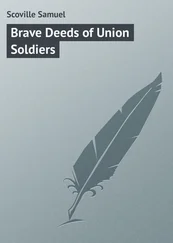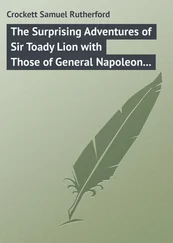Samuel Scoville - Everyday Adventures
Здесь есть возможность читать онлайн «Samuel Scoville - Everyday Adventures» — ознакомительный отрывок электронной книги совершенно бесплатно, а после прочтения отрывка купить полную версию. В некоторых случаях можно слушать аудио, скачать через торрент в формате fb2 и присутствует краткое содержание. Жанр: foreign_prose, foreign_language, на английском языке. Описание произведения, (предисловие) а так же отзывы посетителей доступны на портале библиотеки ЛибКат.
- Название:Everyday Adventures
- Автор:
- Жанр:
- Год:неизвестен
- ISBN:нет данных
- Рейтинг книги:3 / 5. Голосов: 1
-
Избранное:Добавить в избранное
- Отзывы:
-
Ваша оценка:
- 60
- 1
- 2
- 3
- 4
- 5
Everyday Adventures: краткое содержание, описание и аннотация
Предлагаем к чтению аннотацию, описание, краткое содержание или предисловие (зависит от того, что написал сам автор книги «Everyday Adventures»). Если вы не нашли необходимую информацию о книге — напишите в комментариях, мы постараемся отыскать её.
Everyday Adventures — читать онлайн ознакомительный отрывок
Ниже представлен текст книги, разбитый по страницам. Система сохранения места последней прочитанной страницы, позволяет с удобством читать онлайн бесплатно книгу «Everyday Adventures», без необходимости каждый раз заново искать на чём Вы остановились. Поставьте закладку, и сможете в любой момент перейти на страницу, на которой закончили чтение.
Интервал:
Закладка:
On the way back to breakfast, as the sun came up and warmed a slope of the woods, a flock of slate-colored juncos burst out altogether in a chorus of soft little trills, with now and then sharp alarm-notes like the clicking of pebbles together, interspersed with tiny half-whispered notes best expressed by the same letters as those used in writing the grosbeak music – “Teu, teu, teu, teu.” Suddenly, from a farther corner of the sun-warmed slope, I heard a few tinkling notes followed by a tantalizing snatch of rich, sweet song shot through with canary-like trills and runs. I hurried over the snow and caught a glimpse of a little flock of birds with crowns of reddish-brown, and each wearing small black spots in the exact centre of their drab-colored waistcoats. They were tree-sparrows down from the far North, and I was fortunate to have heard the peculiarly gentle cadence of one of their rare winter songs.
Farther on, the caw of a passing crow drifted down from the cold sky, and before I left the woods I heard the pip of a downy woodpecker and the grunt of the white-breasted nuthatch, that tree-climber with the white cheeks which, unlike woodpeckers, can go both up and down trees head-foremost. In the early spring and sometimes on warm winter days, one may hear his spring song, which is “Quee-quee-quee.” It is not much of a song, but Mr. Nuthatch is very proud of it and usually pauses admiringly between each two strains. In my early bird-days I used to mistake this spring song for the note of an early flicker, and would scandalize better-educated ornithologists by reporting flickers several weeks before their time. The last bird I heard before I left the woods remarked solemnly, “Too-wheedle, too-wheedle, too-wheedle, too-wheedle,” like a creaking wheelbarrow, and then suddenly broke out into the flat, harsh “Djay, djay, djay” which has given the silver-and-blue jay its name.
By the time I had reached home, I decided that it was too cold a day to practise law safely. The state legislature in their wisdom had already made the day a half-holiday. Not to be outdone in generosity, I decided to donate my half and make the holiday a whole one. Anent this matter of holidays, the trouble with most of us is that we are obsessed with the importance of our daily work. There are many pleasant byways which we plan to come back and explore when we have reached the end of the straight, steep, and intensely narrow road that leads to achievement. The trouble is that there is no returning. Men die rich, famous, or successful, who have never taken the time to companion their children or to find their way into the world of the wild-folk which lies at their very doors. It was not always so. Read in Evelyn’s Diary how for sixty years a great man played a great part under three kings and the grim Protector, and yet never lost an opportunity to refresh his life with bird-songs, hilltops, flower-fields, and sky-air. We reach our goal to-day in a few desperate years, stripped to the buff like a Marathon runner. One can arrive later and not miss a thousand little happinesses along the way.
With similar arguments I convinced myself on that day, that it was my duty as an amateur naturalist to discover how many birds I could meet between dawn and dark with the thermometer below zero. Certain gentlemen-adventurers of my acquaintance aided and abetted me in this plan. They all held high office in a military organization known for short as the Band. There was First Lieutenant Trottie, Second Lieutenant Honey, Sergeant Henny-Penny, and Corporal Alice-Palace, while I had been honored with a captain’s commission in this regiment. To be sure, there was something of a dearth of privates; but with such a gallant array of officers their absence was not felt. At any hour of day or night, to the last man, every member of the Band was ready for the most desperate adventures by field and flood.
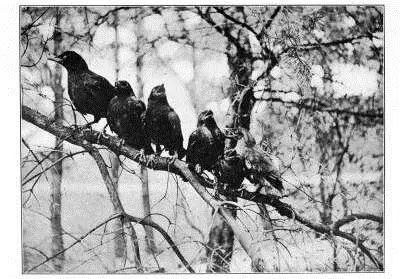
A CROW CHORUS
As we left the house the thermometer stood at four below, while the sky was of a frozen blue, without a cloud, and had a hard glitter as if streaked with frost. In a low tree by the roadside, we heard the metallic note of a downy woodpecker scurrying up the trunk and backing stiffly down. Farther on sounded a loud cawing, and we saw four ruffianly crows assaulting a respectable female broad-winged hawk. One after the other they would flap over her as closely as possible, aiming vicious pecks as they passed. The broad-winged beat the air frantically with her short, wide, fringed wings, and seemed to make no effort to defend herself against her black, jeering pursuers. Once she alighted on an exposed limb. Instantly the crows settled near her and used language which no respectable female hawk could listen to for a moment. She spread her wings and soared away, and as she passed out of sight they were still cawing on her trail.
If the hawk had been one of the swift Accipiters, such as the gray goshawk or the Cooper’s hawk, or any of the falcons, no crow would have ventured to take any liberties. One of my friends, who collects bird’s eggs instead of bird-notes, was once attempting feloniously to break and enter the home of a duck-hawk which was highly regarded in the community – about two hundred feet highly in fact. As my friend was swinging back and forth on a rope in front of the perpendicular cliff, said duck-hawk dashed at him at the rate of some ninety miles per hour. Being scared off by a blank cartridge, the enraged falcon towered. A passing crow flapping through the air made a peck at the hawk as it shot past. That was one of the last and most unfortunate acts in that crow’s whole life. The duck-hawk was fairly aching with the desire to attack someone or something which was not protected by thunder and lightning. With one flash of its wings it shot under that misguided crow, and, turning on its back in mid-air, slashed it with six talons like sharpened steel. The crow dropped, a dead mass of black and blood, to the brow of the cliff below.
Finally we reached the tall, stone chimney – all that is left of some long-forgotten house, which marks the entrance to old Darby Road, which was opened in 1701. At that point Wild-Folk Land begins. The hurrying feet of more than two centuries have sunk the road some ten feet below its banks, and the wild-folk use its hidden bed like one of their own trails. Foxes pad along its rain-washed course, and rabbits and squirrels hop and scurry across its narrow width, while in spring and summer wild ginger, ebony spleenwort, the blue-and-white porcelain petals of the hepatica, and a host of other flowers bloom on its banks. The birds too nest there, from the belted gray-blue and white kingfisher, which has bored a deep hole into the clay under an overhanging wild-cherry tree, down to the field sparrow, with its pink beak and flute-song, which watches four speckled eggs close-hidden in a tiny cup of woven grass.
To-day we followed the windings of the road, until we came to the vast black oak tree which marks the place where Darby Road, after running for nearly ten miles, stops to rest. Beyond stretched the unbroken expanse of Blacksnake Swamp, bounded by the windings of Darby Creek. The Band seated themselves on one of their favorite resting-places, a great log which lay under the trees. Above us a white-breasted nuthatch, with its white cheeks and black head, was rat-tat-tatting up and around a half-dead limb, picking out every insect egg in sight from the bark. As the bird came near the broken top of the bough, out of a hole popped a very angry red squirrel exactly like a jack-in-the-box. The red squirrel is the fastest of all the tree-folk among the animals, but a nuthatch on a limb is not afraid of anything that flies or crawls or climbs. He can run up and down around a branch, forward and backward, unlike the woodpeckers, which must always back down, or the brown creepers, which can go up a tree in long spirals but have to fly down.
Читать дальшеИнтервал:
Закладка:
Похожие книги на «Everyday Adventures»
Представляем Вашему вниманию похожие книги на «Everyday Adventures» списком для выбора. Мы отобрали схожую по названию и смыслу литературу в надежде предоставить читателям больше вариантов отыскать новые, интересные, ещё непрочитанные произведения.
Обсуждение, отзывы о книге «Everyday Adventures» и просто собственные мнения читателей. Оставьте ваши комментарии, напишите, что Вы думаете о произведении, его смысле или главных героях. Укажите что конкретно понравилось, а что нет, и почему Вы так считаете.
